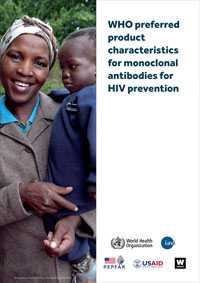July 27, 2022
Read: WHO preferred product characteristics for monoclonal antibodies (mAbs) for HIV prevention
Guide aims to ensure future HIV mAb products are affordable and globally accessible.

The World Health Organization (WHO), IAVI, the U.S. Agency for International Development (USAID), and Wellcome on July 25 launched the guidance document for preferred product characteristics (PPCs) for mAbs for HIV prevention. The WHO develops PPCs to articulate preferred attributes of products for licensure, policy, and programmatic implementation in low- and middle-income countries (LMICs). While PPCs are primarily used for vaccines, the HIV mAbs PPC joins the PPC for Respiratory Syncytial Virus as the second PPC developed for mAbs.
Current prevention methods will be insufficient to meet 2030 targets of ending HIV, even if scaled up. To meet our targets, we’ll need an array of HIV prevention options that meet users’ diverse needs and preferences and involve them early in the development process. mAbs present a promising addition to the HIV prevention toolbox. They offer several potential advantages, including their safety profile, long half-life, and potential broad coverage of diverse HIV strains. These PPCs provide a blueprint, both for lowering delivery costs for mAbs for HIV prevention in LMICs and for essential multi-stakeholder engagement needed to reach everyone who could benefit from access to mAbs.
WHO, IAVI, USAID, and Wellcome created the PPCs in consultation with communities, clinicians, and end-users, resulting in a final product that reflects multiple perspectives and models the kind of collaboration needed to translate science into global health impact.
Download the PPCs on the IAVI website and read more about PPCs on the WHO website.